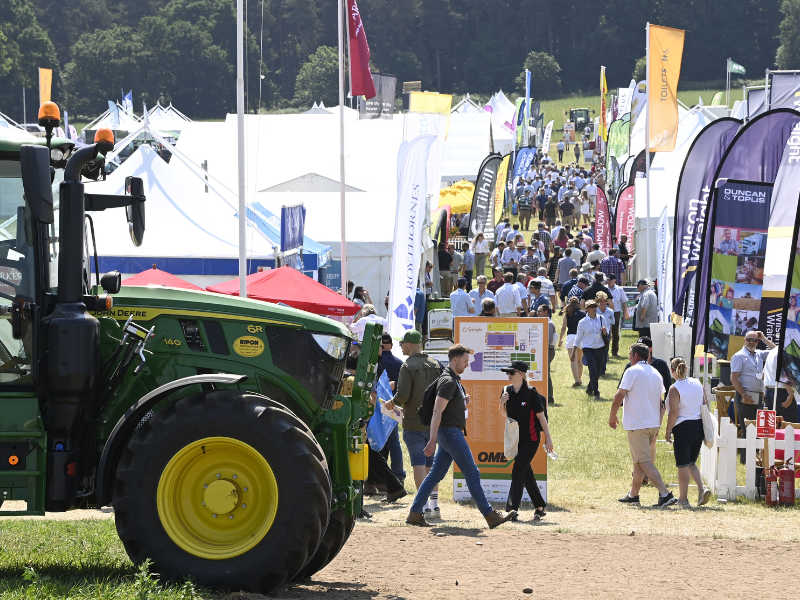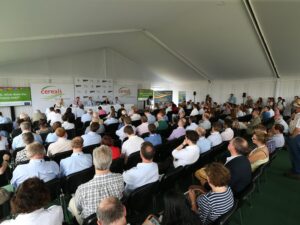The arable sector is constantly innovating, with new products and scientific techniques being developed to improve crop health, farm efficiencies and profitability. And visitors to the Cereals Event will be able to see a whole host of innovations, demonstrations, and technical experts in one place.
To be held at Bygrave Woods in Hertfordshire on 11-12 June 2024, the event’s catalogue of new and returning exhibitors already exceeds 450 arable-focused companies offering a range of technology, machinery, and expertise.
With some 98 new exhibitors this year, key topics and interests are well-covered, from regenerative agriculture to cutting-edge precision techniques.
Get rid of the paper
New exhibitor James Hart, arable farmer and founder of HUSK Data, will be demonstrating how businesses can scrap the paper and save time while collecting data and improving operations.
Fed up with the sheer amount of paper and unable to find a tailorable digital application, he developed a data management system for his own arable enterprise and diversifications, before launching it for other farmers as a desktop and mobile application in 2022.
“Data capture is an increasingly vital element in determining a farm’s efficiency,” says Mr Hart. “And, as we move forward, so is calculating carbon reduction payments and providing proof of action under schemes like the sustainable farming incentive (SFI).”
With six members of staff, three enterprises, and 1,000ha to manage, Mr Hart designed the HUSK application to be flexible, functional on/offline, and simple to use – be that by a one-man-band or a large, staffed enterprise. Registering online, the farmer or contractor logs farm and field details and sets up staff user accounts. Thereafter, they can create a series of tailored forms that prompt the data they want to collect, from cultivations and inputs to diesel usage and grain movement. All users then simply download the mobile app.
Data can be inputted as figures, notes, file attachments and pictures, for which the latter can be time-stamped and geotagged – a valuable feature when submitting evidence of work under schemes.
Regenerative income
Regenerative farming is a focused concept but broad in application. New exhibitor Regenerate Outcomes is helping farmers and landowners pursue an education-based approach to regenerative farming, to generate both ecological and economic gains for their businesses.
With expertise in farming, soil science, and project finance, Regenerate Outcomes works alongside world-renowned soil health consultancy Understanding Ag. It has also partnered with Agricarbon to effectively monitor soil organic carbon stocks under the Verified Carbon Standard (VCS).
Combined, it provides a robust one-to-one mentorship programme which not only improves the ecological condition of land, but also generates new revenue streams. “The programme offers one-to-one soil health training, led by Understanding Ag, with the aim to help farmers reduce input costs and improve plant health,” says director, Tom Dillon.
“As soil health improves, it is expected that soil organic carbon stocks increase and the need for greenhouse gas emitting inputs also reduces. This data is collected according to the VCS, so that the farm may qualify to earn third-party verified carbon credits.”
The programme is not prescriptive – it is adaptive – and works alongside a farm’s changing plans, government schemes, stewardships, and other projects or partnerships. Farmers who join the programme will also become part of a network of regenerative farms, enabling them to have a sound knowledge-board made up of like-minded farmers.
Agri-tech ambitions
With farming and food production at such a pivotal position, new exhibitor the UK Agri-Tech Centre is focused on accelerating agri-tech ambition and matching solutions to problems to drive impactful, rapid change and tackle the industry’s biggest challenges.
Officially launched on 2 April 2024, the UK Agri-Tech Centre combines the expertise of three leading agri-tech innovation enablers: the Agricultural Engineering, Precision and Innovation Centre (Agri-EPI), Crop Health and Protection (CHAP), and the Centre for Innovation Excellence in Livestock (CIEL).
The merger provides a significant boost to the agri-tech sector and is a catalyst to long-term, sustainable food production, and responsible resource use – as part of a circular food system and economy. “One of our strategic priorities is accelerating the adoption of agri-tech,” says chief executive, Phil Bicknell.
“To truly have impact we need to have end users – the farmers. Cereals provides the opportunity to take stock and discuss with farmers – and agri-businesses – the problems faced, ideas to overcome those challenges, and barriers to uptake. It’s about working in collaboration, and we’re here to facilitate and drive innovation in the agrifood sector.”
Another opportunity to be unlocked is access to funding, which will be another talking point with visitors. A recent report by the organisation found that funding is the biggest hurdle to developing and implementing new technologies.
“Lack of access to funding has hindered agri-tech innovation and adoption,” Mr Bicknell adds. “However, there have been and are funding pots to support research and adoption, and we want to support innovators and adopters in making the most of available funding.”
The industry is evolving at a rapid pace, says Cereals event manager, Alli McEntyre. “Arable and contracting businesses are doubling down to make the improvements and adaptions that build resilience within a new framework for agriculture.
“The whole purpose of the event is to make sure that visitors can access a breadth of people, knowledge, and solutions which will help them ready their businesses for the immediate and long-term future.”
For more information and to book tickets, visit www.cerealsevent.co.uk.





